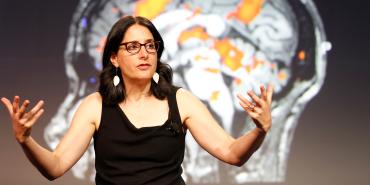Emerging work from the world of neuroscience is providing exciting new clues into how students learn and how teachers can tap that knowledge to help them thrive. In the closing keynote at AFT TEACH, Mary Helen Immordino-Yang, a professor of education, psychology and neuroscience at the University of Southern California, demonstrated that social-emotional learning is essential to children’s brain development.
When people talk about education, they usually talk about procedures and outcomes, Immordino-Yang said. Instead, she argues that learning outcomes are not just products but whole people.
AFT Executive Vice President Evelyn DeJesus introduced Immordino-Yang as someone “who’s going to knock your socks off.” She was right. TEACH participants repeatedly interrupted the scientist’s presentation with applause—especially when she said that community schools work on the premise that it’s the entirety of the school experience that shapes the student and the person.
When she burst upon the education world 11 years ago with a TED talk on children’s learning trajectories, Immordino-Yang affirmed educators’ instincts that social processing and cultural shaping are key to learning. Thinking, she has found, is inherently an emotional process.
Immordino-Yang told TEACH participants that social-emotional learning is the very core of a successful life.
She gave a heartbreaking example of abandoned children raised in institutions in Romania. They had food, beds and toys—things—and a rotating staff of caregivers. As a result, their physical growth was stunted, they were cognitively delayed, and their brains were a third smaller than those of children raised in more typical home environments.
Policymakers often think of education as giving kids things. At TEACH, Immordino-Yang confirmed for educators that students don’t hold nuggets of knowledge like a squirrel with nuts. Instead, the relationships teachers build with their students are opportunities for them to feel and think that lead to learning.
Learning always has an emotional aspect, she said. When people think deeply about things, they can experience the world and construct their space in—and understanding of—that world. That’s why learning is fundamentally social.
Immordino-Yang demonstrated how emotional engagement lights up the same brain systems that keep us alive—the autonomic nervous system deep in the brain stem, which operates far below the level of our conscious awareness. And she explained that learning is all about the subjective experiences of the person.
What, she asked, does learning feel like to your students?
The secret is this: Whatever you’re having emotions about is what you’re thinking about and what you’re going to remember. Are you worried about taking the test? That could actually distract you from learning the material to prepare for the test. The same is true for teachers. As an educator, if you don’t feel safe—say, if you’re worrying about whether you can discuss gender identity in your classroom—you can’t be your best. For all people, heightened emotions can help learning—for example, drawing you into a compelling lesson—or can hinder learning.
Furthermore, students and teachers alike need the space, the time and the safety to stop and reflect on what their lessons mean, she said. We need to support teachers and students to feel safe enough to teach and learn.
The thing that predicts children’s growth is their proclivity to think deeply, the neuroscientist said. Learning that feels connected to their lives is important because it contributes to a sense of wholeness and belonging—and happiness. That’s one reason why community schools are so important.
The bottom line, according to Immordino-Yang: Every child needs adults who love them. That love literally switches on the child’s biological potential. It switches on the brain.
[Annette Licitra]


